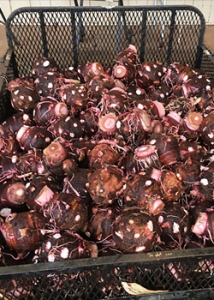
What hasn’t changed during the COVID-19 pandemic is the need for research trials, such as the statewide variety trials of conventionally bred taro on Hawaiʻi Island and Oʻahu by University of Hawaiʻi at Mānoa College of Tropical Agriculture and Human Resources (CTAHR) Extension agents and the Department of Tropical Plant and Soil Sciences.

What has changed is the community’s greater need for food donations. Because of this need, researchers donated the surplus of taro corms to non-profit organizations to help feed communities after they collected data on fresh weights of underground makua corms, percent dry matter, and percent rot; compared how well the varieties grow under different environmental conditions; grew plants outside the measured rows to ensure uniform growth of varieties; and harvested taro corms in border areas.
On Hawaiʻi Island, about 175 pounds of taro corms were donated to the culinary arts program at Hawaiʻi Community College; some were used in their cafeteria and the remainder went to feed those in the Puna district through collaboration with Vibrant Hawaii and Chef Hui programs. In addition, Nicholle Konanui (former CTAHR plant research technician) organized a team of gleaners and harvested about 800 pounds for #FeedThePeopleHI-Puna project. Taro variety trials in Pepeʻekeo were conducted with the assistance of Waiākea Research Station Farm Manager Angel Magno and his crew of agricultural technicians.
On Oʻahu, more than 1,500 pounds of surplus taro corms were donated to a community food drive. The amazing yield and vigorous growth of taro hybrid #1005-84 at Waimānalo Research Station is attributed to their care by Farm Manager Roger Corrales and his crew of agricultural technicians.
“Research is often thought to have benefits over the long-term. In these cases, research resulted in immediate benefits to communities,” said Susan Miyasaka, Hawaiʻi County administrator. “Our faculty and staff are proud to help feed the community during these tough, pandemic times. Mahalo to Jari Sugano and Amjad Ahmad.”

